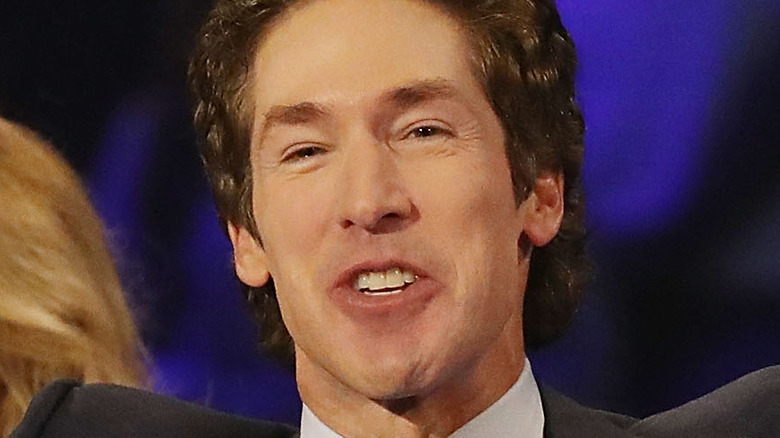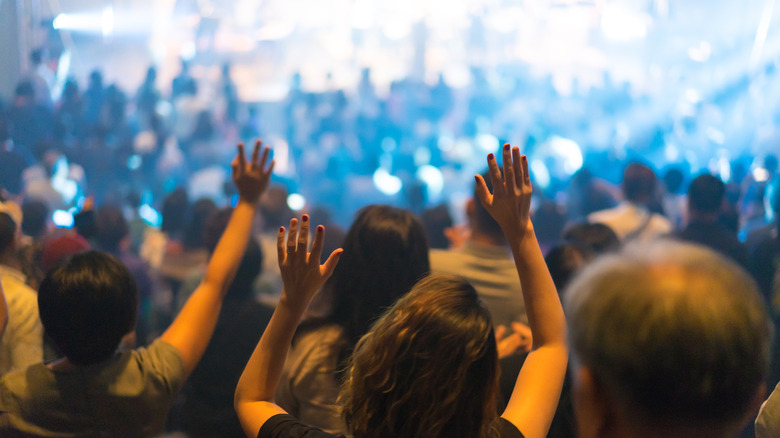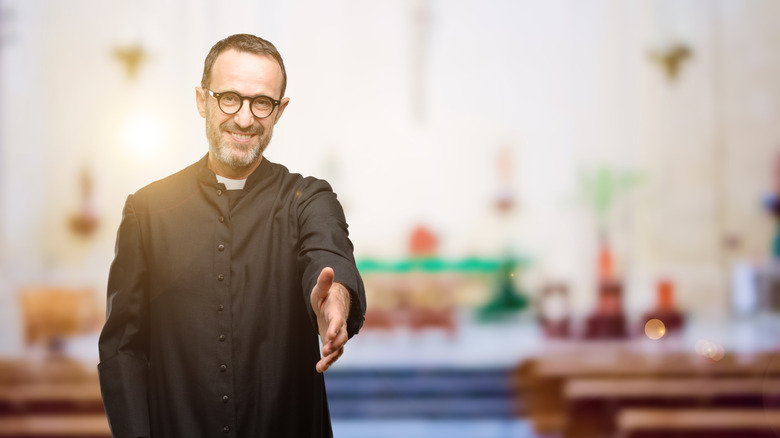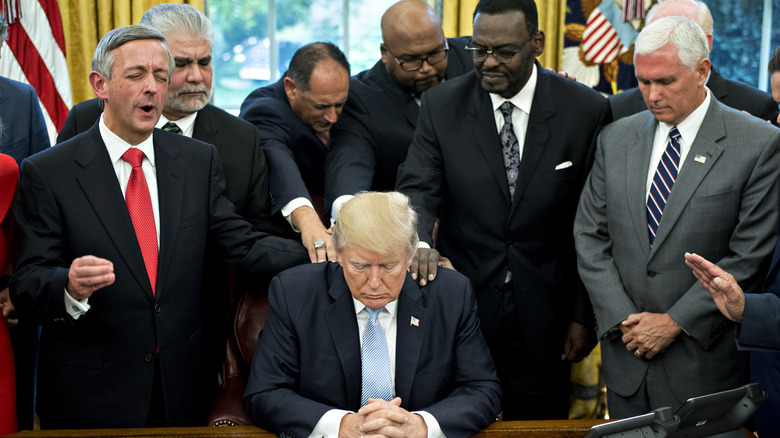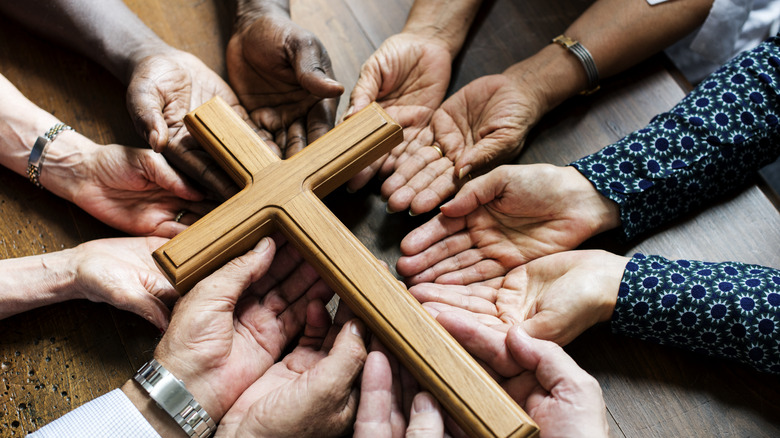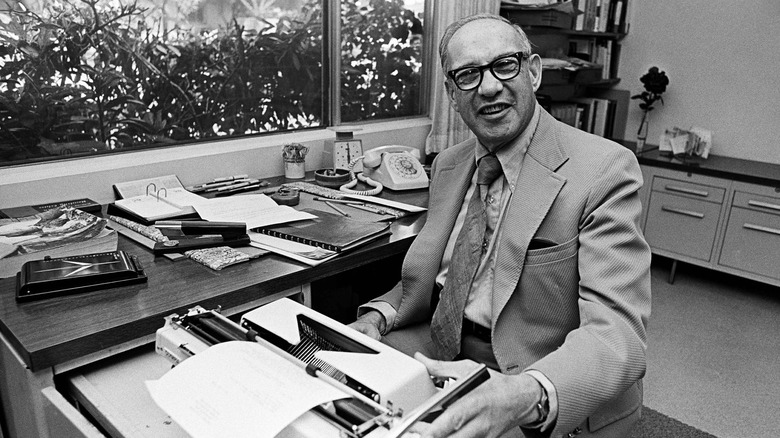The Dark Side Of Megachurches
The concept of the "megachurch," generally defined as a church (almost always Protestant Christian) with a regular congregation of at least 2,000, is still new enough to seem strange to outsiders. While there have been churches with very large congregations throughout history, the earliest congregations that could fit the mold of a megachurch date back to just the mid-19th century. Even so, for more than a century these enormous churches remained outliers and exceptions.
Megachurches became a phenomenon in the mid-20th century—nearly all of the churches currently considered megachurches were established after 1955. But these oversize houses of worship didn't really take off until the 1980s. Since that decade, the number of megachurches in the U.S.—and their average congregation size—has increased year on year.
For many, megachurches are a positive for both individuals seeking spiritual engagement and communities that benefit from the programs and services these churches provide. Megachurches make worship an entertaining, spectacular experience shared with a large audience and bring people together. But as the phenomenon has grown in popularity, problems have arisen. It's fair to say that any large movement or organization will have its share of downsides, but the "mega" in megachurches means those downsides can be pretty huge. Here's the dark side of megachurches.
Megachurches spread the prosperity gospel
When you think of megachurches, chances are you think of a slick, smiling pastor standing in front of a huge crowd, probably wearing a really nice suit. And that pastor probably travels around in a private plane and lives in a mansion, because many megachurches are associated with what's known as the "prosperity gospel."
As explained by Vox, the prosperity gospel is a concept that boils down to a belief that God rewards faith with material success—in other words, if you pray hard enough, God will make you rich. If that seems a little counter to traditional Christian concepts, you would be correct—it excuses any societal inequalities and puts the blame for being poor on you, personally. The implication is that if you're suffering, you don't have enough faith.
As Vox also explains, it provides cover for greedy pastors. Guys like Joel Osteen, pastor of the megachurch Lakewood Church and worth about $50 million, don't have to hide the money they get from the church because their wealth is simply a sign of their holiness and faith. In fact, some have speculated that the subprime housing crisis of 2008 was in part caused by prosperity gospel-believing people who took on mortgages they couldn't afford because they reasoned God was rewarding their faith. And it's not unique to the U.S.: As Reuters notes, the wealth of megachurch pastors in Africa has been controversial for years now.
They encourage selfishness
It's easy to assume that the folks who join megachurches are extremely religious and spiritual. Churchgoing is, after all, baked into the fabric of American life, with churches traditionally serving as centers of communities. The idea that only good, dedicated Christians make the time to attend church services automatically lends a superficial air of piety to megachurches.
But as noted by Pastor Jeremy Howard, the teachings at megachurches often contradict the traditional Christian concept of service and charity. Instead, megachurches encourage a selfish and self-focused view of worship. The members of megachurch congregations are often taught to focus on their own existence and problems, instead of seeing themselves as servants who should help their fellow man. They are in turn encouraged to view God as a vehicle for their ambitions. This goes hand-in-hand with the prosperity gospel often at the core of megachurch theology—the idea that God rewards faith with material goods and success.
As noted by The Journal Standard, the congregations at megachurches tend to be younger than traditional churches and are more likely to be single. And most tellingly, 45 percent of megachurch members fail to volunteer to serve their community, underscoring the focus on the self that is celebrated at these large services.
Megachurches are eroding our sense of community
In a traditional church, services are fairly intimate. A small-town church or even a neighborhood church in a large city might have a congregation of a few dozen or a few hundred people, most of whom live in close proximity as neighbors. But in a megachurch, literally thousands of people attend splashy, slickly-produced services, with more frequently watching on television.
As noted by Premier Christianity, this tends to encourage "spectator worship." Because the crowds are so large, the majority of the attendees do not actively participate, much less get to know each other. The anonymity enjoyed by congregants is seen as a feature of megachurches, as it makes stepping inside for the first time a safe, comfortable experience. But it also means that there is very little sense of community. The experience is more similar to attending a show—in fact, most megachurches put a lot of effort into passively entertaining the attendees.
Pastor Jeremy Howard points out how this encourages people to stay within themselves because they can hide in the crowd, enjoy the show, and feel zero obligation to engage or take part. Although tens of thousands of people might attend services at a megachurch over the course of a week, they rarely meet each other or interact, inhibiting any sense of community.
Megachurches turn worship into entertainment
Anyone raised as a Christian probably has a childhood memory of being bored to tears in church, and possibly being scolded for causing a fuss. Worship services were never intended to be fun or exciting—they're intended to be instructive, to bind people together in faith and reinforce the precepts of Christianity.
But as noted by Religion News, megachurches have evolved to become more like entertainment venues. Their services are often staged in arenas and large theaters that accommodate thousands of worshipers and have extremely high production values. As a direct result, society has increasingly conflated church services with entertainment.
Pastor Jeremy Howard notes how the need to keep megachurch congregants entertained has driven increasingly absurd stunts—like the megachurch that dropped Easter candy from a helicopter, or the one that staged a Christmas celebration using characters from the Disney film "Frozen." Howard explains that this focus on performance and spectacle is antithetical to actual Christian teaching, which states that your actions are meaningless without faith and humility. It also leads to an escalating "hype" as the need to keep worshipers entertained drives increasing entertainment value over spiritual content, rendering worship meaningless. After all, if you can't tell whether you're at church or "Frozen on Ice," what does worship mean anymore?
They're run like corporations
Considering how much money is involved in megachurches (according to Fox Business, some rake in hundreds of millions of dollars every year, primarily from voluntary donations called "tithes") it isn't too surprising that they're often run like businesses. But all churches exhort donations from their members, so the fact that megachurches benefit from economies of scale isn't too surprising.
As noted by Forbes, the pastors of these churches act more like CEOs than spiritual leaders, and megachurches routinely establish media and publicity teams to help them maintain their congregation and even grow it. In fact, an entire industry has grown up around helping megachurches become even more mega. But megachurches have two advantages over traditional corporations: One, they're exempt from many taxes, and two, they benefit from a large volume of unpaid volunteers who often devote much of their time to working on the church's behalf.
The dark side to this corporatization of religion is how focused on growth the megachurches have become. As noted by MSNBC, some megachurches are exploring setting up satellite branches that act almost like franchises, causing a kind of "Wal-Mart Effect" as they take worshipers away from the traditional local church.
Megachurches turn pastors into celebrities
One of the most notable differences between megachurches and more traditional churches with smaller congregations is the celebrity status of the pastors. While it makes sense that anyone who appears in front of an audience of thousands every single day—as well as on television—would become somewhat famous, the dark side of this celebrity status is that a shocking number of pastors implode as a direct result.
As reported by Relevant Magazine, the list of megachurch pastors who have been removed from their jobs due to inappropriate behavior is shockingly long. Perry Noble, once pastor of NewSpring Church, resigned when his alcoholism began to affect his ability to lead his congregation. Darrin Patrick was removed as pastor of The Journey megachurch after his behavior—including extramarital affairs—became impossible to ignore, and he later died by suicide. Even Billy Graham's grandson, Tullian Tchividjian, resigned in scandal due to an extramarital affair, as did Hillsong Church's pastor Carl Lentz.
Being a pastor of a megachurch is often likened to being the CEO of a corporation, and many pastors feel incredible pressure. It's also an extremely isolating position, as literally every aspect of your life comes to involve the church and its members. At the same time, the pastors of these megachurches are treated like rock stars.
Megachurch pastors are increasingly political
Religion has always been intertwined with politics, and religious leaders have always tried to exert influence over their congregation on various issues. A pastor exhorting his congregation to vote according to Christian values is one thing, a pastor using his position to push a specific agenda is something else. But one dark aspect of the growing influence of megachurches is how their pastors are involving their congregations in politics.
As reported by The Intercept, several megachurches banded together in an effort to re-elect President Donald Trump in 2020. Some of the members of this coalition openly support the idea that the United States was never meant to have a separation of church and state—that its government should be explicitly Christian. And Texas Monthly reports that some megachurch pastors like Robert Jeffress act more like campaign officials than spiritual leaders, explicitly supporting Republican candidates in elections.
Megachurches have also led the way in politicizing the COVID-19 epidemic and taking sides in "culture war" issues. The Los Angeles Times reports that megachurch pastor John MacArthur has not only resisted orders that congregants wear masks but has denied that there is any pandemic at all. And as noted by The Independent, other megachurches have been fined for flagrantly ignoring pandemic rules designed to protect the public.
They're quietly racist
To their supporters, one of the major benefits of megachurches is their diversity. Because they are designed to welcome newcomers and have such large congregations, they often have or openly support multiracial congregations. And as reported by The New York Times, many Black churchgoers sought out these megachurches out of a sense of duty—to be missionaries of a newly integrated worship experience. But as noted by the Daily Beast, many of these parishioners are leaving these megachurches as they exhibit increasingly explicit conservative politics.
Now many Black members of megachurch congregations have begun to leave them. For some, the way evangelical churches supported Donald Trump in the 2016 election and beyond was untenable. But for many, the racism they experienced went back much further. According to Baptist News Global, 27 percent of Black practicing Christians felt pressure to give up their racial identity in order to fit in, and 28 percent found it difficult to build relationships and fit in.
This is exacerbated by the fact that megachurch leadership is overwhelmingly white. As a result, even when Blacks and other minorities are invited to join and participate in a megachurch, they are usually expected to "code switch" and change their clothing and behavior to conform. The irony is that as more Black parishioners leave, the megachurches become increasingly white.
Megachurches encourage abusive environments
In an ideal world, your church should be a sanctuary. Whatever your spiritual beliefs, attending church should be an opportunity to reflect, meditate on your existence, and seek the support of a like-minded community and a wise spiritual leader. Unfortunately, many megachurches created abusive, harmful environments instead.
As noted by Vanity Fair, after Carl Lentz was fired as the pastor of Hillsong Church, stories of high-ranking church officials having inappropriate sexual affairs with volunteers along with stories of physical, verbal, and emotional abuse that resulted in a "culture of silence and fear" began to surface. And as noted by Vox, Lentz and Hillsong are hardly alone when it comes to pastors having sex scandals and megachurches being revealed as hotbeds of inappropriate behavior and abusive environments.
The dark atmosphere hidden beneath the glitz and glamour of many megachurches doesn't stop at horny pastors, though. The Columbus Dispatch reports that in 2019, the pastor of Christ Community Chapel in Ohio was fired when allegations of sexual abuse at an orphanage run by the megachurch came to light. And NBC News reports that a megachurch in Louisiana ran "boot camps" where teenagers were forced to perform dangerous physical tasks until they vomited. Minorities and women were taunted with hateful slurs, and any teen suspected of being gay was emotionally abused for days.
They're extremely anti-LGBTQ
While it's never surprising that religious folks who claim to be all about love and salvation are generally not at the forefront of tolerance—especially when it comes to LGBTQ rights—megachurches are particularly bad. On the one hand, the fact that NBC News reports that exactly zero of the country's largest megachurches are LGBTQ-affirming—meaning the church will not only welcome LGBTQ members, but also ordain, hired, marry, and baptize them—isn't a surprise, considering the evangelical traditions these megachurches are built on. Conservative Christians are among the fiercest opponents of LGBTQ rights.
On the other hand, as noted by The Washington Post, megachurches often try to have it both ways by being deliberately vague on their policies in order to avoid bad publicity and seem more progressive than they are. This can lead to LGBTQ members believing they're fully accepted by their church when in fact they are not. And many megachurches welcome LGBTQ parishioners only because they plan to subject them to "conversion therapy" to "cure" them of their sexual orientation.
As noted by Essence, what makes this infuriating as well as dark is how many megachurch pastors are fired for immoral behavior—or for being secretly homosexual themselves.
They're extremely sexist
As noted by The New York Times, the evangelical religious tradition that evolved into the modern megachurch makes no mystery about its view on gender roles: Wives are expected to submit to their husbands, and gender roles are clearly marked out by the teachings of the Bible. For many female parishioners in the country's megachurches, this isn't controversial—it's the spiritual life they have chosen.
Women have gained status and influence in megachurches and the wider evangelical movement, but they are still barred from being pastors or holding high leadership positions. Academics James Wellman, Katie E. Corcoran, and Kate J. Stockly argue that this sort of "soft patriarchalism" leads directly to the long list of sex scandals plaguing megachurches, as it puts pastors and other church leaders in positions where they can manipulate women placed under their care and authority.
This sexism is causing another problem for the megachurches: Difficulty in finding pastors. As noted by Outreach Magazine, megachurches have a very specific profile they look for when seeking a pastor: Age 38 to 49, with experience leading a church with at least 500 congregants, and married with young children. As interest in becoming a pastor wanes in the younger generations, megachurches are struggling to identify men who can take on the role—something that would be solved if women were granted equal status.
The Megachurch concept has fascist roots
As noted by The Atlantic, one of the key people who shaped the modern megachurch was Peter Drucker. Drucker was born in Austria but became a citizen of the United States in 1943. Britannica explains that he's famous for helping create the modern concept of the corporation and the development of management theory, but he was an instrumental consultant who helped create the modern "seeker-sensitive" model that most megachurches follow. And his philosophy was essentially fascist.
As noted by historian Barry Clark, Drucker was explicitly anti-fascist—he was a man who fled Hitler's Germany, after all, and he was a vocal critic and opponent of fascism in his lifetime. But Clark argues that Drucker was actually a critic of the form of fascism extolled by Hitler and Mussolini—that Drucker believed the failure of fascism was the fact that it ignored the spiritual aspects of existence.
As noted by The Orthosphere, Drucker worked with early megachurch pioneers like Rick Warren in the 1980s to translate his management theories to the megachurch model. And modern megachurches echo many aspects of fascist ideology. They are leader-focused, with pastors given total authority. Parishioners are expected and required to surrender much of their decision-making to the church—and to conform to church policies without dissent. The idea that "leaders must be followed, that the community must be served" is an essentially fascist concept.
